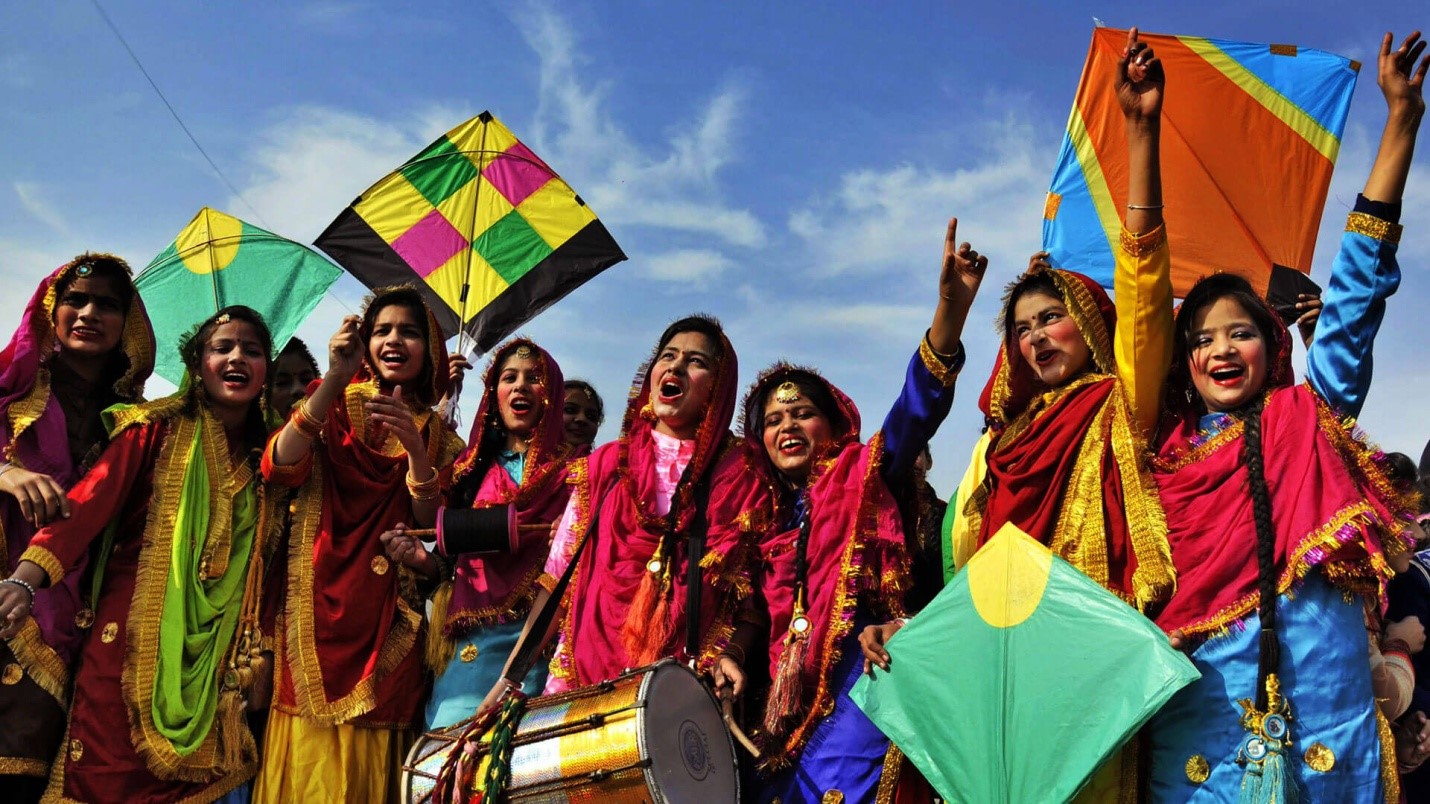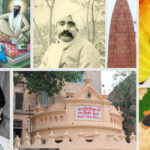Punjab is a place of vibrant colours, upbeat music, and kind smiles. All of this, paired with intense dancing sessions, results in the many bright festivals that the province is known for. Festivals are a great way to get a sense of the essence of this lovely state. A festival is an event when individuals show off their goals, values, and true selves in a symbolic way. Punjab’s liveliness is evident through the vibrant festivals it commemorates. If you’re planning a vacation to Punjab, remember to check the calendars for a few of the festivities so you may experience the state’s cultural diversity. The following is a list of Punjabi festivals that you should attend at least once in your life.
Let’s have a look at the festivals of Punjab you must enjoy:-
Baisakhi
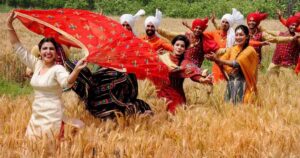
Baisakhi is amongst the most important Sikh festivals, and it is observed with great zeal and joy all across Punjab and other parts of the world where there would be a considerable Sikh community. Baisakhi Festival commemorates the harvest of rabi crops in Punjab, and it is celebrated with a happy dance. The tenth Sikh Guru, Guru Gobind Singh, established the Panth Khalsa-the Order of the Pure Ones on Baisakhi Day in 1699, making Baisakhi Festival extremely sacred for the Sikh community. Baisakhi is a Punjabi holiday that is celebrated with zeal and dedication. Because the festival is so important to the Sikh religion, the day’s main events are held in Gurdwaras.
Lohri
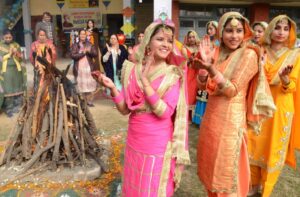
The Punjabi folklore festival of Lohri is a prominent winter folklore celebration. Lohri is India’s first and most diverse festival, which is commemorated with great fanfare and vigour. This harvest festival starts in northern India, primarily in Punjab, with an anniversary event honouring farmers for their hard labour and the work that allows us to live a successful life.
This festival is marked by the lighting of bonfires, which signifies soil good health and generate warmth among community members. People chant songs and throw nuts, peanuts, and other agricultural tokens into the fire while they move in rounds around the bonfire. In Punjab, Lohri is a magnificent festival of brotherhood and kindness.
Teeyan
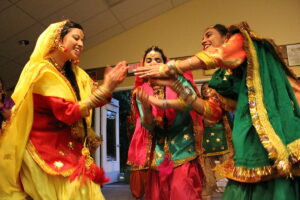
Teen in the Punjab state’s women’s dancing festival. During the ceremonies, Giddha is at its most beautiful. The dancing normally occurs on the bank of the river during the month of Sawan, once the days in the summer have become longer and warmer. Swings are hung from the branches, and people begin singing, swinging, and dancing to the tunes that fill the air. The start of the monsoon season is marked by Teeyan, or Punjabi Teej. Teeyan, regarded as one of Punjab’s best festivals, runs for thirteen days, beginning on the third day of Saawan Maas and ending on Saawan Purnima. All married woman was required to spend the Saawan month at their maternal home.
Gurupurab
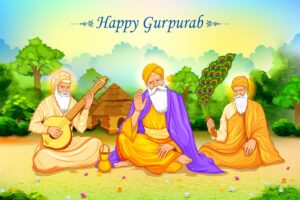
Guru Nanak Jayanti, or Guru Nanak Gurpurab as it is more generally known, is a Sikh festival celebrated with devotion and fanaticism in many areas of India by Sikh and Punjabi celebrations alike. The Sikh community’s major festival, the different Gurupurabs, are a subject of holiness, spirituality, and jubilation for the Sikhs. They commemorate the anniversaries of the Sikh Gurus’ births or martyrdoms. A religious pilgrimage, in which sacred songs are chanted, begins and ends the festival. The Guru Granth Sahib, the Sikhs’ holy scripture, is read aloud during the celebration. Folks go to gurdwaras to offer prayers, pray, and eat langar, which is delightful and holy.
Basant Panchami
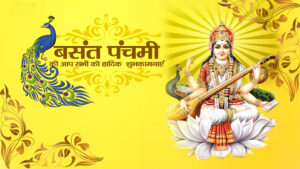
The Basant Panchami celebration ushers in the Basant, or spring season. It is observed forty days before the actual advent of spring since it is thought that seasons must transit and bloom for at least forty days. Another memorable aspect of Basant Panchami is the significance of the colour ‘Yellow.’ Farmers in Punjab who had planted mustard seeds in their fields. As spring arrives, these fields transform into a lovely yard filled with millions of yellow flowering flowers. Namdhari Sikhs wear yellow and distribute langars at gurudwaras to express their thanks to the Supreme by exchanging their harvest with each other. Punjabis fly kites from the top of buildings to celebrate Basant Panchami. The energy of Punjabis is unmistakably personified by spring.
Bhai dooj

Bhai Dooj is a Hindu religious celebration that takes place on the second day of Shukla Paksha in the Kartik maas. This festival’s customs are similar to those of Raksha Bandhan. The festival takes place all over North India, especially Punjab. Bhai Dooj is all about delicious sweets and spending time with family, and it celebrates the brother-sister bond. The sister conducts aarti and tika on her boys’ foreheads as part of their ritual. The sister subsequently ties the kalawa around her brother’s wrist, recalling their previous promises to keep her safe. Special sweets and meals are served as part of the celebration. Bhai Dooj, which falls on the second day following Diwali, is yet another jewel in the series of festivities.
Karwa Chauth
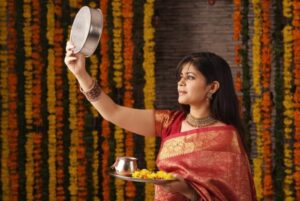
Karwa Chauth is observed on the fourth day of the waning moon fortnight in Kartik when wedded and committed women fast from sunrise to moonrise for their husband’s health and quality of life. This is a holiday that commemorates the marriage relationship between a husband and a wife. The purpose of this day is that it is a day when married ladies fast for their partner’s long life and well-being. Men were thought to be the be-all and end-all in a woman’s life because they were the main supporter, primary earner, and provider of everything nice.
Maghi
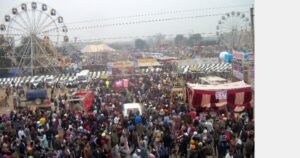
Maghi is an annual mela celebrated at Muktsar Sahib in honour of forty Sikh martyrs. This holiday was first described and observed by Guru Amar Das, Sikhism’s third guru. Later on, however, a custom of remembering the Sikh martyrs who lost their lives to safeguard the tenth guru began. During the commemoration of this holiday, people eat kheer made with sugarcane juice.
